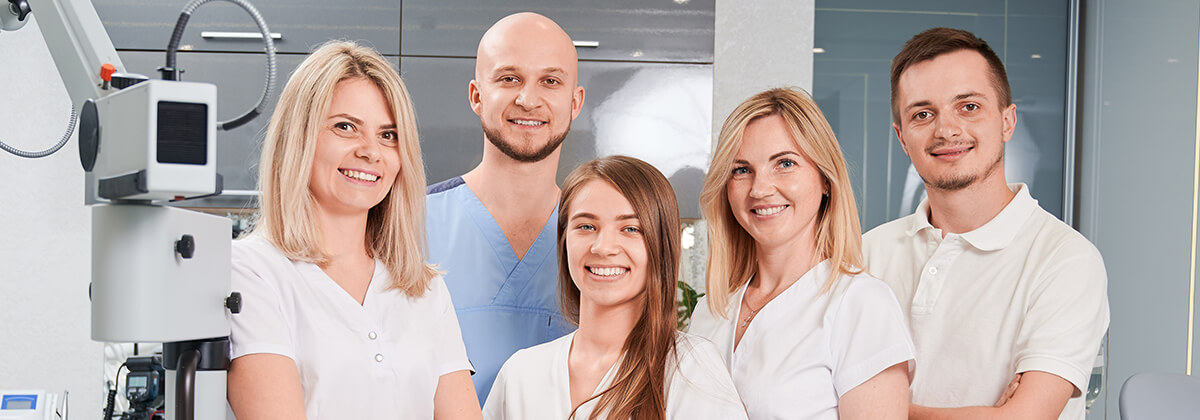Dental Team Training: The Ultimate Guide to Creating Outstanding Practice Professionals

Running a dental office requires a passion for oral healthcare, advanced training on the latest procedures and treatment options, and a talented team of professionals to support patients and practice operations. Your staff is the glue holding your office together, so their onboarding and training should be comprehensive. This process lays a foundation for success and gives your patients the best oral healthcare experience possible while in your care.
This guide provides important insights about how your training strategy can help or hurt your practice and offers essential tips to help your team become the stellar crew your office needs.
Training Is About More Than SOPs and Shadowing

In any medical field, getting your dental staff to perform at its best requires more than the standard onboarding protocols found in a restaurant or accountant's office. You need to create a next-level team cohesiveness that empowers your staff to self-manage when necessary and come together to achieve practice goals efficiently.
The benefits of this approach are something that every dental practice manager would want:
- Decreased employee turnover
- Stellar patient care experiences
- Engaged staff
- Boosted productivity
- Consistent positive feedback from patients
- Less time spent overseeing day-to-day tasks
Dental offices that teach their team members how to collaborate and communicate create a sense of ownership within their ranks. This effort translates into better decision-making regarding patient care and operations. If you're spending significant time micromanaging your team, it's time to re-evaluate your training goals and methodology.
So, what steps can you take today to revamp how your dental practice trains and onboards its staff? The following best practices can help you do just that and improve every aspect of your hiring and onboarding processes.
Be Clear About Your Dental Brand's Vision

From the moment your dental office begins its search for talented professionals, clearly outline your practice goals. Sharing these expectations ensures applicants understand how important their role is to your brand's long-term goals. By creating a vested interest during the hiring process, you can nurture dedication for your clinic and help new team members seamlessly integrate with your existing employees faster.
Set Aside Time Specifically for Training

On-the-job training is an invaluable experience for any new staffer, but you want to ensure core principles regarding performance and other expectations aren't lightly glossed over. Also, remember that onboarding isn't a one-and-done process. Your team members will need to receive refresher training periodically throughout the year, so having dedicated times for these events is essential.
Whether you plan to simply role-play upselling techniques or educate your newest staffers about standard policies within your organization, strive to provide a distraction-free environment. This means sequestering them into a private meeting room or holding training workshops offsite so the sole focus is on learning. You don't want staff to balance answering front desk calls while also trying to learn about a new EHR integration.
Make Team Huddles a Daily Ritual
Training time doesn't always center around SOP documentation and employee handbook reviews. It's also about building a cohesive team of dental professionals and nurturing their collaborative efforts.
Team huddles are a fantastic way of bringing everyone together and reinforcing the importance of their roles individually and as a unified crew. These meetings are the perfect time to review daily goals, long-term milestone progression, performance metrics, and learn how things are going for everyone.
Taking time each day to spend ten minutes checking in on the happenings around the office also acknowledges workgroup roles and the achievements and challenges everyone faces. These get-togethers support the training employees have received around important aspects of your dental organization, including:
Goodbye Lighthouse360, Hello $1.6M: How Adit became Dedicated Dentistry’s growth engine Exceptional patient care deserves exceptional systems. Behind the scenes, outdated tech was holding this practice...
Download Case Study- Customer service
- Upselling
- Performance expectations
- Practice policies
Keeping everyone on the same wavelength means less drift when it comes to compliance and boosts motivation to help your practice succeed.
Be Consistent About Best Practices

Has your office been experiencing instances of employees going rogue when enforcing clinical or administrative policy? When disorganization rears its ugly head, team members make more mistakes which directly impact patient attitudes about your dental services.
Any training you provide should include best practices for staffers to make decisions upon throughout their day. It's also vital that you take a consistent approach when applying these principles. Your office can't just claim it cares about the oral healthcare outcomes of its patients; it must have policies in place that support this goal. Having this guidance ensures that every patient that walks into your clinic receives the same level of top-quality care and minimizes disruptions in your operations that can impact their experience.
Implement Cross-Training
Working in a busy dental office can feel like running a 10-meter dash between appointments, and cross-training your team to cover additional roles can mean the difference between efficiency and chaos. Offering further career development opportunities is an important aspect of employee training. It drives ambition and improves retention while providing patients with a consistent care experience when short-handed.
Your dental practice has high expectations and a long-term strategy for success, so why not give your team the skills necessary to make this possible? When staff cancellations inevitably happen, knowing you have another certified professional on hand to fill in during those times is essential to supporting performance, productivity, and patient expectations.
Invest in Professional Training Opportunities
Investment is an essential ingredient in any training strategy. While you may know what goals and expectations you have for your employees, investing in workshops and continued education opportunities can help your practice realize these milestones sooner.
Set aside a budget to send team members to dental conventions featuring seminars, workshops, and exhibitions that educate and inspire. Your dedication to providing the necessary skills and knowledge to perform their roles enhances business goals and nurtures loyalty.
Create Step-by-Step Reference Guides for Practice Systems

One of the biggest challenges in running an efficient dental practice is ensuring employees follow procedures and processes consistently. This is especially important on the administrative side of your operations because dental patients expect more than just a comfortable root canal experience. They want scheduling to be hassle-free, no surprises on their bills, straightforward communication with your team, flexible payment opportunities, and quick access to their dental records.
Breaking down these processes into a series of steps ensures consistent interaction with your patients. And having a manual that outlines core protocols, such as onboarding new patients or collecting on past due accounts, creates a foundation for steady practice growth.
Treat Mistakes as Teachable Moments
To err is human; to forgive divine. However, learning is an important piece of this equation that rarely gets mentioned. Training your employees is an ongoing process that requires regular assessment of your policies, role expectations, and consistent adherence to the guiding principles of your dental brand. Inevitably, mistakes will happen, but in those moments, you can treat them as a setback or an opportunity to improve.
When errors occur, this is the best time to reflect on what elements led to the failure and adjust your practice policies and processes to address areas of your operation that allowed it to happen. Have one-on-one and group discussions about the issue and develop actionable insights that can be leveraged to address it.
The ability to reflect, learn, and implement can better prepare your office for future challenges and avoid unnecessary discouragement.
Be Clear About Team Roles in Your Practice
How many times have we heard someone say that a particular issue or expectation wasn't "in their pay grade"? This language often insinuates that one is being asked too much or could signal they aren't sure what is or isn't part of their job role. Dentists and practice managers owe a detailed explanation of each team member's job role, scope, and all expectations regarding performance.
Consider creating a detailed job description for each employee and ensure to check in regularly about any concerns or questions they might have about their roles. It's important to take feedback seriously and keep things positive when reviewing performance. This will ensure that staffers are honest with you about their position and feel safe discussing frustrations or needed changes to make their role more satisfying.
Provide Comprehensive Training on Tools and Software

While dental college teaches your employees how to use specialized tools and perform oral healthcare procedures, these institutions don't cover all of the latest technological advancements within the industry. In fact, you'll find that even your existing team will need regular refreshers and training courses to keep up with the fast-paced innovation dentistry has been experiencing.
Your office must provide safe and reliable care to meet and exceed patient expectations regarding their dental health. Doing so often requires multiple software tools and integrations that might have a learning curve to overcome before your employees can use these features efficiently. Implementing new software can create a hurdle to employee buy-in efforts, but this is avoidable by choosing the right practice management tools.
For example, if your current PMS system requires several different programs to book an appointment, it adds unnecessary complexity to employee training. This is why end-to-end solutions like Adit are the preferred choice of dentists everywhere. Bringing everyday functions under a single umbrella means less training time for employees.
Dental practice management software is vital in reducing errors, centralizing communication, enforcing clinic processes, and streamlining workloads to boost productivity and patient experiences. Any PMS solution you choose should bring your office together or seamlessly integrate with your current systems to simplify time-consuming tasks.
You Need More Scripting
Another area of training that is crucial for new and existing dental employees is scripting. It's easy to explain that you want your team to upsell whitening kits or encourage patients to schedule a consult for Invisalign treatments. But how do they do it? If you expect off-the-cuff suggestions, nine times out of ten, team members will forget or fumble information. This approach decreases the likelihood of a patient agreeing to additional electives that would boost your revenue.
Scripting is an essential element in every one of your employees' toolboxes. Knowing what, when, and how to discuss products, billing issues, and other dental care matters with patients requires practice. Conduct role-play opportunities throughout the year and every time a new product or oral healthcare technique is added to your clinic's services. These exercises help hone your team's interpersonal communication skills to be more productive in interacting with patients.
Support Effective Team Training with Adit
After reading this article, it's easy to see how dental employee training goes far beyond printed-out handbooks and signed policy acknowledgments. Developing a strong team of dental professionals demands training and onboarding strategies enduring beyond the first 90 days or even a year. It's a living process that mentors, inspires, and supports your staff throughout their careers with your practice.
Sure, there will still be a few checklists for new hires to review as they transition into your established team, but empowerment is an equally important ingredient in training.
Adit provides dental organizations with state-of-the-art dental practice management software to leverage automation and AI-driven analytics while boosting team productivity by balancing workloads. You can train employees how to perform their job roles, but they need the necessary tools to eliminate bottlenecks and balance their flows.
Our platform helps your staff provide dental patients with high-quality care experiences through the use of 15+ intuitive practice management tools, including:
- Adit Voice
- Patient Forms
- Online Scheduling
- Adit Pay
- Call Tracking
- TeleMed
- Patient Recall
- Secure SMS Messaging
- Online Patient Portal
- Practice Analytics
- Pozative Review Module
- Marketing & Advertising Support
- Dental Website Design
Give your dental team the necessary foundation tools to meet and exceed your expectations. Schedule your free demo today to find out how Adit's practice management software can support and improve employee performance while simultaneously boosting patient outcomes and your bottom line.
more about Adit?
Say goodbye to the hassle of using multiple tools. Adit centralizes your calls, texts, payments, reviews, and scheduling into one powerful dashboard. Simplify your operations and boost patient satisfaction today.
Schedule a DemoAngela is a former English teacher turned marketing content specialist. Over the past 10 years, she’s developed marketing strategies to forge enduring bonds between B2B, B2C and SaaS companies and their clients through holistic education, effective communication, and captivating storytelling that moves audiences to act.
Get a $25 Gift Card when you take a demo
Schedule a DemoGet a $50 Gift Card
when you take a demo
Looks like you're out of bounds!
Hey there! Your current location falls outside Adit's area of operation. If this is unexpected, try disabling your VPN and refresh your page. For further assistance or to book a live demo, connect with us at 832-225-8865.
February 28 Amazon Demo Promo
Terms and Conditions
Last Updated: February 28, 2026Offer ends March 3, 2026, and is limited to prospective customers who sign an annual agreement before February 28, 2026. Gift card will be emailed to the company owner or established representative within 4 weeks of signing the annual agreement. Offer may not be combined with any other offers and is limited to one (1) gift card per office. Offer is not available to current customers or to prospective customers or individuals that have participated in a Adit demo during the prior six (6) months. Recipient is responsible for all taxes and fees associated with receipt and/or use of the gift card as well as reporting the receipt of the gift card as required under applicable federal and state laws. Adit is not responsible for and will not replace the gift card if it is lost or damaged, is not used within any applicable timeframe, or is misused by the recipient. Adit is not responsible for any injury or damage to persons or property which may be caused, directly or indirectly, in whole or in part, from the recipient’s participation in the promotion or receipt or use of the gift card. Recipient agrees to indemnify, defend and hold harmless Adit from and against any and all claims, expenses, and liabilities (including reasonable attorney’s fees) arising out of or relating to a recipient’s participation in the promotion and/or recipient’s acceptance, use or misuse of the gift card. This offer is sponsored by Adit Communications, Inc. and is in no way sponsored, endorsed or administered by, or associated with Amazon.
Thank You!
We appreciate your interest! Adit AI will be calling you in the next few minutes!
Why Adit?
Cut your software bill by up to 60% when you merge everything your dental office needs to run under one roof.
Centralize Communications
- Phones & TeleMed
- Emails & eFax
- Texting & Reminders
- Call Tracking and more!
Streamline Operations
- Patient Forms
- Online Scheduling
- Payments
- Reviews and more!
Boost Production
- Performance Dashboards
- Morning Huddle
- Claims & Collections
- Patient Profiles
- Follow Up Lists
- Year Over Year Metrics
Acquire More Patients
- Digital Marketing
- Website Design
- SEO
- Google Ads
- Facebook Ads
when you sign up with Adit!
Sign up by filling out the form







